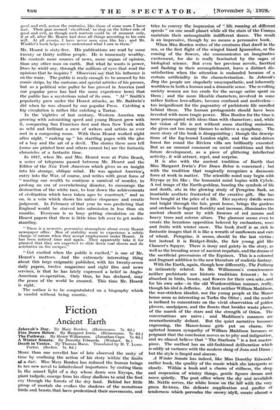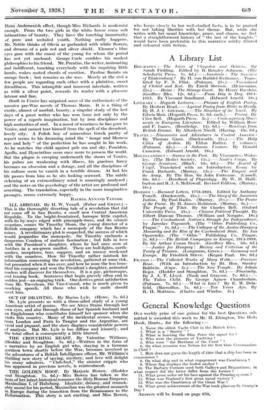Fiction
Ancient Earth
Mom than one novelist has of late observed the unity, of time by confining the action of his story Within" the limits of a (last; Miss Mary Borden has reduced the human beings in her new novel to infinitesimal importance by casting them in the sunset light of a day whose dawn sees Eryops, the giint tadpole, emerge from his shiny shaitoivs to send the first cry through the forests of the dry land. Behind her little group of mortals she evokes the shadows of the monstrous birds. and beasts-that have predestined their--movements, and tries .to-convey the: impressiops of "life, running at different speeds " on one small planet while all the stars of the COinios maintain their unimaginable indifferent dance. The result is an impressive, though by no means a persuasive book.
When Miss Borden writes of the creatures that dwell in the sea, or the first flight of the winged lizard Iguanodon, or the coming of the flowers, she communicates an imaginative excitement, for she is really fascinated by the sagas of biological science. But even her previous novels, facetted and flashing in their accomplishment, leave a distinct dis- satisfaction when the attention is undazzled because of a certain artificiality in the characterization. In -Jehovah's Day the people are singularly unsympathetic, and inherently worthless in both a human and a dramatic sense. The revolting society women are too crude for the savage satire spent on them ; and the more likeable characters, involved -in some rather listless love-affairs, become confused and MOtiveless- toO insignificant for the pageantry of prehistoric life unrolled behind them. The human protagonists should have been invested with more tragic power. Miss Borden for the time is more preoccupied with ideas than with characters ; and, while her vision of life is not without some startling omissions, she gives out too many themes to achieve a symphony. The mere story of the book is disappointing ; though the descrip- tions of the fog-bound London night, and the wind-driven forest fire round the Riviera villa are brilliantly executed. But as an unusual comment on social conditions and their future development, as a piece of glittering intellectual activity, it will attract, repel, and surprise.
It is also with the ancient tradition of Earth that Miss Margaret Irwin's Fire Down Below is concerned ; but with the tradition that magically recognizes a daemonic force at work in matter. The scientific mind may begin with Eryops or his like ; the humanist mind begins with Cybele. A red image of the Earth-goddess, bearing the symbols of life and death, sits in the glowing study of reregrine Sark, an insatiable aesthete frustrated of the creative gift. - She has been bought at the price of a life. Her mystery dwells warm and bright through the fair, great house, brings the gardens and orchards to flagrant floridity and increase, illuminates the ancient church near by with frescoes of red moons and heavy trees and solemn altars. The glamour seems even to create the luxurious opposition beloved by enchanters, roses and fruits with winter snow. The book itself is so rich in fantastic images that it is like a wreath of sunflowers and ears of wheat. Peregrine, it seems, should be the last victim ; but instead it is Bridget-Bride, the fair young, girl like Chaucer's Squyer. There is irony and gaiety in the story, as well as the brooding sense of ancient requitals, and the dream of the sacrificial processions of the Equinox. This is a coloured and fragrant addition to the new literature of realistic fantasy.
With the Earth, again, though how differently, The Pathway is intimately related. In Mr. Williamson's consciousness neither prehistoric nor historic traditions ferment ; he is absorbed in birds, beasts, and flowers for their own sake, and for his own sake—in the old Wordswoithian manner, really, though his idol is Jefferies. At first neither William Maddison, the war-stricken idealist, nor the young people at the Manor house seem as interesting as Tarka the Otter ; and the reader is inclined to concentrate on the vivid observation of golden plovers, sandpipers, and the florets that braider waste places, of the march of the stars and the strength of Orion. The conversations are naive ; and Maddison's manners are neurasthenically defiant. But the quiet narrative becomes engrossing, the Manor-house girls put on charm, the agitated human sympathy of William Maddison becomes so poignant that the conclusion moves us to pity andindignation, and we almost believe that " The Starborn " is a lost master- piece. The method has an old-fashioned deliberation which is oddly at variance with the modern slang of Jean and Diana ; but the style is limpid and sincere.
A Winter Sonata has indeed, like Miss Dorothy Edwards' earlier book, the quality of the music which she interprets so closely. Within a hush and a charm of stillness, the sleep and suspension of wintry things, gentle figures dream and move quietly. The poit office where the shy and invalidish Mr. Nettle serves, the white house on the hill with the very green fir-trees, the delicate supplication and proffer of tenderness which pervades the snowy idyll, create almost. a Hans Andersenfgh effect, :though Miss Richards is Modernist enough. From the two girls in the white house come soft intimations. Of beauty. They hav'the touching immaturity of pure and secluded youth. Nothing really happens. Mr. Nettle thinks of Olivia as garlanded with white flowers, and dreams of a pale red and silver shield. Eleanor's blue eyes gaze with the ennui of the young for whom the portal has not yet unclosed. George Curie confides his modest philosophies to his friend. Mr. Prentiss, the writer, insinuating and indifferent, touching everybody with his inquiring little hands, wakes muted chords of emotion. Pauline flaunts an orange frock ; but remains as she was. Merely at the end a few people are regarding each other with a plaintive, sweet friendliness. This intangible and innocent interlude, written as with a silver point, rewards its reader with a pleasure intense and fine.
Death in Venice has surprised some of the enthusiasts of the massive pre-War novels of Thomas Mann. It is a thing of exotic, almost of morbid, beauty, a- singular study of the last days of a great writer who has won fame not only by the power of a superb imagination, hitt by iron disciplines and high austerities of soul. In a mood of weariness he has gone to Venice, and cannot tear himself from the spell of the decadent, lovely city. A Polish boy of miraculous Greek purity of aspect seems to his dreaming mind the " image and likeness rare and holy " of the perfection he has sought in his work. As he watches the child against pale sea and sky, Poseidon, Apollo, and Hyacinthus seem once more to possess the world. But the plague is creeping underneath the shows of Venice, his pulses are wakening with illness, his gracious fancy becomes an obsession and a dotage, and all the disciplines of his culture seem to vanish in a terrible dream. At last his life passes from him as he sits looking seaward. The subtle sickening of an extraordinary mind is amazingly analysed ; and the notes on the psychology of the artist are profound and arresting.- The translation, especially in the more imaginative passages, seems extremely happy.
RACHEL ANNAND TAYLOR.



















































































































 Previous page
Previous page